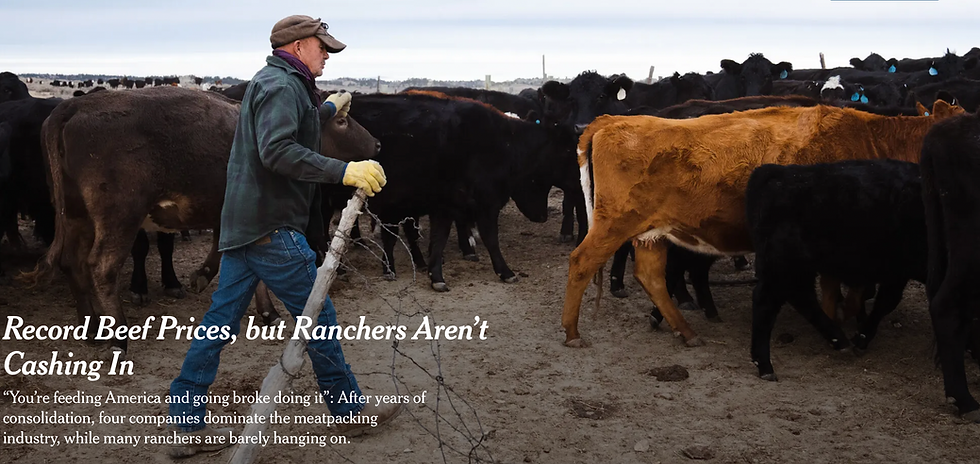Hey NY Times - You Forgot to Mention...
- Beth Hoffman

- Jan 8, 2022
- 3 min read
About a week ago, the New York Times ran an article entitled "Record Beef Prices, but Ranchers Aren't Cashing In" that looked at the multitude of issues now plaguing the beef industry.
At the core of most of the problems is the almost complete control of the entire system by four meat packing companies - Tyson, Cargill, JBS and National Beef (the last two are also Brazilian owned). These companies dictate the prices they will pay to cattle producers because there is no competition, no where else the ranchers can sell.
But one part of the article really stuck out to me. Although the author mentioned that the family he profiled sold directly to customers when the going got tough, he forgot to mention that there is now an entire alternative universe of beef production in the country where direct sales happen regularly. We might be a smaller segment of ranchers in the nation, but we are pioneering a different business model, one that is a better way forward for the country than a return to “business as usual” serving huge multinational conglomerates making billions of dollars off our labor.

In comparison to the ranching style depicted in Goodman’s article, our model is a striking improvement in almost every way. First, we raise far fewer cattle, rotate them daily, and keep them on the farm eating grass for their entire lives. That means no grain (corn or soybeans) is grown with pesticides to feed the cattle, no bald fields in wintertime eroding into the waterways, no heaps of manure to dispose of - the cow paddies simply decompose into the soil where it was laid. Then we work directly with the local slaughterhouse, which in our case sits 45 minutes from our farm, which had the good sense to only book six months out - a system that works well for both them and the farms they serve. And because our customers are directly involved in the purchase, their orders are cut to their exact specifications, while we capture 100% of the profits, allowing us to keep our prices steady year after year.
It is not a perfect system - customers need freezers to store a lot of meat and it is not “efficient” in producing the maximum amount of beef on the smallest amount of land in the shortest amount of time. But it is far better for the land, puts more money in the rancher’s hand, and the animals are healthier, never receiving antibiotics unless illness necessitates it. The 1200 pound animals also range in the amount of space that befits them, eating what their ruminant bellies can process well (grasses, not corn). And the land is never cleared of trees - important carbon sinks - nor is it trampled to death as in a feedlot.
It is true that this system will produce less meat. But instead of fearing “fake meats” and sustaining a nation of daily (hourly?) meat eaters at any climate cost, we should work toward making beef again what it should be - a specialty item. It would cost more and not everyone will be able to afford to eat it every day. But is that a bad thing? Reducing the number of cattle in the country can only have positive benefits for the health of the population and for our planet; continuing on with the way the industry has worked in the past decade, simply because people want cheap meat, is not a reason to perpetuate the status quo.
I would encourage Steve Charter to do this - sell off most of your breeder cows. Then, with a core number of your best ones, start breeding for cattle that can fatten without all of the expensive corn and antibiotics. Let your daughter use social media to spread the word on how your system now works better for you, the land and the cattle - and watch as the customers line up to buy your beef.
It is a shift to an alternative universe that will require an adjustment period and the support of government and rural communities to create the infrastructure needed. We need more processing facilities, more distribution centers, and better ways to get rurally raised meat (and vegetables for that matter) to population centers. But more “transparency” into a system that was created to exploit farmers will not change it. Change will happen from creating new models in which “we” - farmers, planet, animals, and customers - can all thrive.





Comments